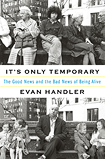Evan Handler Shares the Good News -- and the Bad -- of Being Alive
 Evan Handler |
Sometimes the most effective muse is a diagnosis of imminent death.
Shortly after Evan Handler learned, at the age of 24, that he had leukemia and a life-expectancy of "not very long," he began making notes on an oversized laptop about his medical ordeal and other matters of a problematic existence that seemed about to end all too soon.
Even as he recorded this story, though, its plot line changed. Against all odds, and with the help of a bone-marrow transplant, Handler emerged five years later cancer-free -- and with a survivor's memoir that, after first coming to life as a theater piece, in expanded prose form became his first book, Time on Fire: My Comedy of Terrors (Little, Brown).
In losing his disease, Evan Handler -- known as an actor from such hit Broadway plays as Six Degrees of Separation and the television series Sex and the City -- acquired a second career as a writer.
 Now he's produced a second volume, It's Only Temporary: The Good News and the Bad News of Being Alive (Riverhead), which picks up where the first one ended.
Now he's produced a second volume, It's Only Temporary: The Good News and the Bad News of Being Alive (Riverhead), which picks up where the first one ended.
The good news is obvious. But what could be bad? How can a man given a second chance at life not face each day with unbounded joy?
"I think most people have difficulty appreciating things as fully as they intellectually know they should," said Handler, now 47 and living in Los Angeles, a coast away from his once-native New York. "I think the sort of backward way I've lived life -- experiencing old age and near death first -- doesn't change the circumstances or the struggle. It just maybe intensifies and crystallizes the issues.... Life inevitably becomes a series of choices: 'Do I indulge myself now, or do I make an investment toward a future?' And when you don't have as much trust in a future as maybe other people do, it makes some of those longer-term investments more difficult. It can lead to a real restlessness. As the book tells, I ping-ponged around for a long time, not knowing exactly which way to live my life."
But, as happened when Handler was writing his first book, life threw him some unexpected curves.
"I met a woman and fell in love, and had the feeling this was the ideal person for myself," he explained, "after having [earlier] come to the conclusion that that was even an immature way to imagine finding love."
Handler the lifelong bachelor married his newfound love. Then he and his wife learned they would have a child -- something else Handler had been told by doctors was for him all but impossible.
"Well, okay," he said, "to me, it's a pretty incredible story."
And a much more upbeat one than any he imagined he'd ever tell of himself.
That satisfying tale is related by its author in It's Only Temporary in a roundabout and creative manner, reflecting the unpredictable ways life unfolds.
"I wanted to write a memoir that by the end would give people a rich portrait of a person and of their psychological makeup, and tell the story of a period of time," Handler said, "but do it via individual anecdotes that don't necessarily supply the narrative information in order.
"When I meet someone, I don't say: 'Okay, start at the beginning; tell me your life story, and catch me up to now.' ... And yet, I don't experience getting to know that person as something frustrating or incomplete. Part of the pleasure is in fitting the puzzle pieces together, and filling in the information as you get it."
It's Only Temporary, then, tells of various dysfunctional relationships, existential ponderings, thespic successes, screenwriting disappointments, regrets, and rejoicings -- all divulged one story at a time, through flashbacks, revelations, confessions, and reflections that mirror the states of mind of the person living such scenes. "Part of the point of the book," said Handler, "is to have the reader go through things and experience the emotions that I experienced as I was living them. Then a lot of them are looked back on later in the book, with a different perspective, and re-examined."
Throughout, the author drew on the lessons he'd learned in life, in writing, and as a performer, one of the best of them being: "Humor is the passkey into almost anything." With humor, Evan Handler opened a door onto his own unexpected happy-ending: one in keeping with his own subjective mix of fear and euphoria, sadness, and joy.
"I tend to write Hallmark-card material," he said, "in the most un-Hallmark way possible. I don't trust optimism from optimists. I think it's much more effective coming from pessimists." --Tom Nolan

